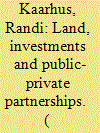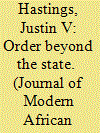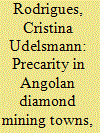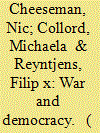|
|
|
Sort Order |
|
|
|
Items / Page
|
|
|
|
|
|
|
| Srl | Item |
| 1 |
ID:
158482


|
|
|
|
|
| Summary/Abstract |
Two decades after the ‘third wave of democratization’, extensive violence continues to follow elections in sub-Saharan Africa. Whereas national processes connected to pre-election violence have received increased scholarly attention, little is known of local dynamics of violence after elections. This article examines the 2011 Nigerian post-election violence with regard to the ways in which national electoral processes interweave with local social and political disputes. The most affected state, Kaduna State, has a history of violent local relations connected to which group should control politics and the state. It is argued that electoral polarisation aggravated national ethno-religious divisions that corresponded to the dividing line of the conflict in Kaduna. A rapid escalation of violence was facilitated by local social networks nurtured by ethno-religious grievances.
|
|
|
|
|
|
|
|
|
|
|
|
|
|
|
|
| 2 |
ID:
158479


|
|
|
|
|
| Summary/Abstract |
In recent years, Niger has gained prominence as a hub for the smuggling of migrants from West Africa to North Africa and Europe. Urged on by European concerns, Niamey has adopted repressive measures to contain such migrations in the region. These, however, have largely failed, and have yielded unintended and unexpected results, which challenge policy predictions. Drawing on extensive fieldwork, the article suggests that contradictory security imperatives have brought about the de facto regularisation of human smuggling. As a result, protection rackets sponsored by the state through patronage networks have severely limited the impact of externally sponsored measures to counteract irregular migration.
|
|
|
|
|
|
|
|
|
|
|
|
|
|
|
|
| 3 |
ID:
158480


|
|
|
|
|
| Summary/Abstract |
Influential discourses present Foreign Direct Investment (FDI) as essential for agricultural development in Africa; a parallel, critical debate on ‘land rushes’ has denounced Land Grabs, demanding increased accountability in FDI-based land deals. This article explores an initiative located in central Mozambique, the Beira Agricultural Growth Corridor (BAGC). It shows how the international fertiliser company Yara set out to enrol actors at different levels in business, governance and agricultural development into BAGC as a public-private partnership to promote commercial agriculture. Very soon, however, Yara made shifts in its engagement and market strategy, leaving the BAGC initiative to supporting donors and local producers. The analysis presented here shows how the tension between ‘patient-capital’ requirements, high risks and low immediate returns have shaped this case over time – in a context of a national political economy framed by extractive-resource dynamics.
|
|
|
|
|
|
|
|
|
|
|
|
|
|
|
|
| 4 |
ID:
158477


|
|
|
|
|
| Summary/Abstract |
How do some places with weak institutional capacity avoid being caught in the cycles of violence and criminality so often associated with African institutions in the ‘failed states’ literature? This paper exploits in-country variation in piracy incidence across different regions of Somalia to investigate how some territories with low state capacity can nonetheless deter piracy and provide relative order. We find that the usual explanation – state ‘failure’ in Somalia, compared with a reasonably functional government in Somaliland – does not withstand scrutiny. Somaliland's lack of piracy was not due to ‘strong’ state institutions, but can be attributed to the strength of a discourse that emphasises Somaliland's ‘inherent’ capacity for order against the disorder supposedly endemic to the rest of Somalia. The exploration of the discursive underpinnings of Somaliland's supposed ‘piratelessness’ has implications for understanding the relationship between state institutions, political order and violence, particularly where the state does not exercise a monopoly on force.
|
|
|
|
|
|
|
|
|
|
|
|
|
|
|
|
| 5 |
ID:
158481


|
|
|
|
|
| Summary/Abstract |
After nearly 30 years of civil war, Angola gained peace in 2002. The country's diamond and oil wealth affords the national government the means to pursue economic reconstruction and urban development. However, in the diamond-producing region of Lunda Sul, where intense fighting between MPLA and UNITA forces was waged, the legacy of war lingers on in the form of livelihood uncertainty and uneven access to the benefits of the state's urban development programmes. There are three main interactive agents of urban change: the Angolan state, the mining corporations, and not least urban residents. The period has been one of shifting alignments of responsibility for urban housing, livelihoods and welfare provisioning. Beyond the pressures of post-war adjustment, the wider context of global capital investment and labour market restructuring has introduced a new surge of corporate mining investment and differentiated patterns of prosperity and precarity in Lunda Sul.
|
|
|
|
|
|
|
|
|
|
|
|
|
|
|
|
| 6 |
ID:
158478


|
|
|
|
|
| Summary/Abstract |
The historical literature on statebuilding in Europe has often portrayed a positive relationship between war, state making and long-term democratisation. Similarly, a number of large-n quantitative studies have concluded that war promotes democracy – even in cases of civil war. Against this, a growing area studies literature has argued that violent conflict in developing countries is unlikely to drive either statebuilding or democratisation. However, this literature has rarely sought to systematically set out the mechanisms through which war undermines democracy. Contrasting three ‘high conflict’ cases (Burundi, Rwanda and Uganda) with two ‘low conflict’ cases (Kenya and Tanzania) in East Africa, we trace the way in which domestic conflict has undermined three key elements of the democratisation process: the quality of political institutions, the degree of elite cohesion, and the nature of civil-military relations. Taken together, we suggest that the combined effect of these three mechanisms helps to explain why Kenya and Tanzania have made significantly greater progress towards democratic consolidation than their counterparts and call for more in-depth research on the long-term legacy of conflict on democratisation in the African context.
|
|
|
|
|
|
|
|
|
|
|
|
|
|
|
|
|
|
|
|
|